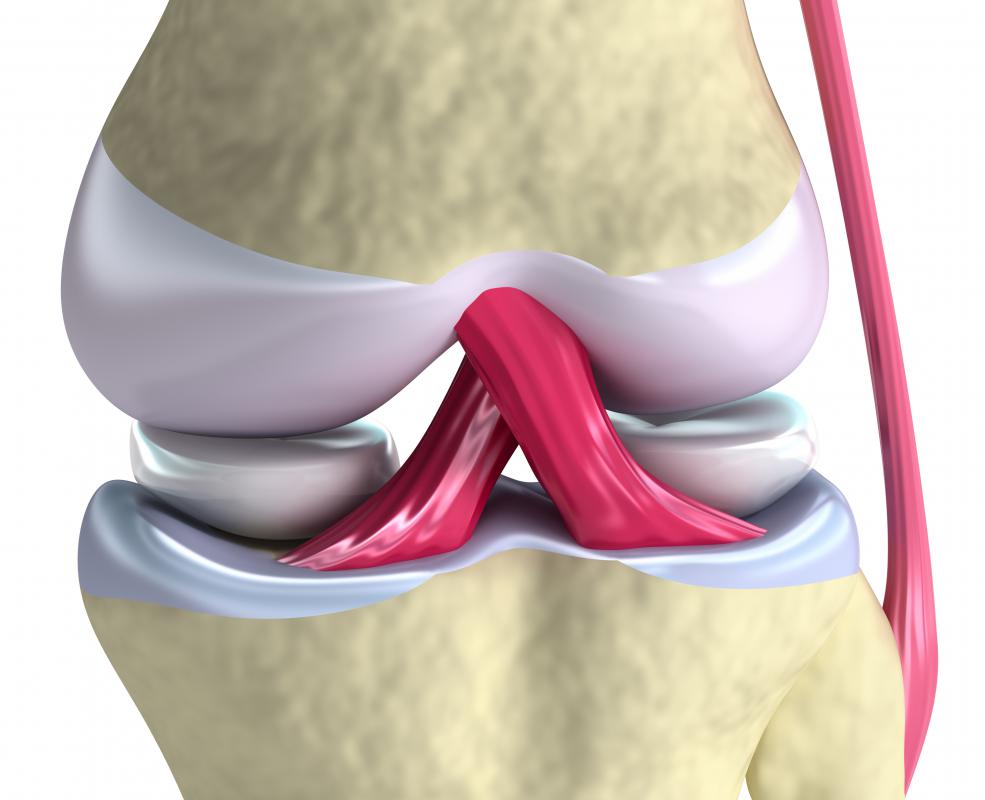At TheHealthBoard, we're committed to delivering accurate, trustworthy information. Our expert-authored content is rigorously fact-checked and sourced from credible authorities. Discover how we uphold the highest standards in providing you with reliable knowledge.
What Causes Knee Popping?
Knee popping is usually no cause for concern if the popping occurs on its own. If the knee popping is accompanied by pain, however, a serious issue may exist within the knee. The popping may be due to different conditions, from torn ligaments to damaged cartilage within the knee. To figure out what causes knee popping, one must usually visit a doctor who can identify the source of the movement or damage within the knee that leads to the sound. Conditions such as arthritis or tendinitis can sometimes lead to popping, and the severity of the condition depends on whether pain is felt or normal motion is altered or prevented altogether.
Cartilage is tough tissue within a joint that acts as a buffer or shock absorber. This cartilage can become damaged, leading to knee popping, and since cartilage receives little blood flow, healing may be slow or impossible. Knee cartilage that is damaged can lead to other problems that can alter the function of the knee, so if one suspects cartilage damage, he or she should consult a doctor immediately. Sometimes surgery is necessary to rectify the problem; in very severe instances, joint replacement may be necessary.

Dislocations within the knee can sometimes lead to knee popping that will most often be accompanied by a significant amount of pain. A dislocation occurs when the normal movement of the joint is altered, either as a result of a direct impact or due to ligament or other tissue damage that allows the joint to move in ways it should not move. The knee popping may be the sound of a ligament tearing, cartilage tearing, or bones moving. If extreme pain is felt, it is necessary to seek medical attention immediately, as it is likely that the ligaments in the knee have torn and will need to be repaired.

Sometimes movement within the knee can cause popping that is not necessarily damaging or dangerous in any way. Ligaments, bones, and cartilage can move during normal functioning of the joint, leading to popping or cracking sounds. If no pain accompanies these sounds, there is usually no reason to worry about the noise. If the popping noise accompanies another known malady such as arthritis, it may be wise to consult a doctor even if pain is not felt, as this may be an indication that the joints are beginning to wear or degrade, as is the case with most bouts of arthritis.
AS FEATURED ON:
AS FEATURED ON:














Discussion Comments
@MikeMason-- I'm not a doctor but if you experience this all the time, it might be a sign of weak knee muscles.
I used to experience the same before I started working out regularly at the gym. It's definitely not due to injury but due to insufficient use of muscles in the knee. Once I started to do knee exercises and strengthen the muscles there, the popping sound disappeared.
If you start having knee popping with pain though, you should see an orthopedic to figure out what's going on.
Every time I crouch down and bend my knees, I hear a slight popping sound but I don't have any knee pain. Is this bad?
I heard my knee pop during a soccer game a few years ago. I wouldn't have paid attention to it if it wasn't for the pain. It turned out that I dislocated my kneecap. I didn't play for more than a year after that. I had to get physical therapy as well.
Post your comments